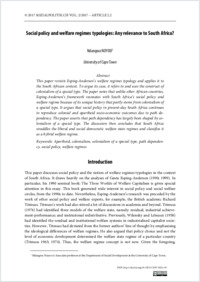Contested claims to social welfare : Basic income grants in Namibia
- Klocke-Daffa, Sabine University of Tübingen
-
2017
Published in:
- sozialpolitik.ch. - 2017, vol. 2, no. 2, p. Article: 2.3
anthropology
unconditional basic income grants
social welfare
giving and sharing
gift economy
distributional model
poverty reduction
rightful share
short-term exchanges
long-term exchanges
Namibia
Otjivero, Witvlei, ELCRN
Basic Income Grant Namibia (BIG)
English
In many parts of the world, income transfers to underprivileged groups have long been part of social welfare programmes. However, the conditionality of such grants has recently been challenged on a global scale, arguing that income grants should serve as a mechanism to redistribute national resources rather than filling the social gap, and be conceded to all members of the population. The only country that tested this kind of social policy is Namibia with its Basic Income Grant project (BIG). Ever since its launch in 2007, there has been a heated nation- and even worldwide debate concerning the pros and cons of an unconditional grant. This paper presents the results of an anthropological research, showing that in discussion on poverty reduction and the “rightful share” for the needy, the cultural factors governing decision making on the micro level have so far been neglected.
- Collections
- Faculty
- Faculté des lettres et des sciences humaines
- Department
- Département des sciences sociales
- Language
-
- English
- Classification
- Social sciences
- License
- License undefined
- Identifiers
-
- RERO DOC 306438
- DOI 10.18753/2297-8224-93
- Persistent URL
- https://folia.unifr.ch/unifr/documents/306228
Statistics
Document views: 32
File downloads:
- 2017_2_Article_Noyoo.pdf: 51
